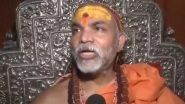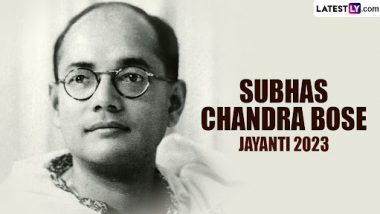Netaji Subhas Chandra Bose was a great freedom fighter who rebelled against the British and did his part to help India achieve independence. "Give me your blood, and I shall give you freedom" - this quote by Netaji Subhas Chandra Bose sparked patriotism in the hearts of many Indians to join the fight for the country's independence. Even today, these words don't fail to inspire and move us. His undeterred attitude and resolution to make India free still inspires many people. Read on to learn more about the date, history, significance and celebrations of Subhas Chandra Bose Jayanti 2023. January 2023 Holidays Calendar With Major Indian Festivals & Events: Check List of Important Dates During the First Month of the Year.
Date and Significance of Subhas Chandra Bose Jayanti
Netaji Subhas Chandra Bose was an Indian Nationalist and a great freedom fighter who rebelled against the British and urged the nation's people to resort to radical forms of protest and revolution. To pay tribute to his contribution to India's struggle against colonial forces, Subhas Chandra Bose's birth anniversary is celebrated across various parts of the country on January 23 every year. The formal National Day is also known as Parakram Day or Bravery Day. Netaji's 127th birth anniversary will be observed this year on Monday, January 23.
History Of Netaji Subhas Chandra Bose Jayanti
Netaji Subhas Chandra Bose was born to Prabhavati Bose and Janakinath Bose on 23 January 1897 in Cuttack, Orissa. Subhas Bose followed his five brothers in 1913 to Presidency College, Calcutta, the historical and traditional college for Bengal's upper-caste Hindu men. After completing his degree in Philosophy in Calcutta, he was sent to England to study for the Civil Services exams. In 1921, he returned to India, where his fervent patriotism led to him being considered a rebel by the British authorities.
Interesting Facts About Netaji Subhas Chandra Bose
- The term 'Netaji' is Hindustani for 'Respected Leader' and was first given to Bose by Indian soldiers in 1945.
- Netaji was expelled from his college once when he assaulted Professor Oaten, who made anti-national comments and manhandled Indian students.
- Bose's radical activity against the Britishers led to him getting imprisoned 11 times.
- He was a progressive thinker and wanted women to enlist in the Indian National Army to fight for the country.
- Netaji's death is covered in mystery as many of his supporters have refused to believe he died in the plane crash.
- "Give me your blood, and I shall give you freedom" by Netaji sparked motivation and patriotism in the hearts of many Indians who fought against British rule back then.
Netaji worked within the ambit of the Indian National Congress politics for nearly 20 years. He also started the newspaper 'Swaraj' (Self-Rule) and took charge of publicity for the Bengal Provincial Congress Committee. In 1927, Bose became general secretary of the Congress party and closely worked with Jawaharlal Nehru against colonial rule.
(The above story first appeared on LatestLY on Jan 16, 2023 01:36 PM IST. For more news and updates on politics, world, sports, entertainment and lifestyle, log on to our website latestly.com).













 Quickly
Quickly


